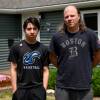The Danvers school committee was caught in the eye of the storm of controversy at its monthly meeting Monday over a high school hockey team’s alleged hazing behavior, involving racial slurs and sexual abuse — and that school and city officials had helped to conceal the actions — after it was reported in the Boston Globe over the weekend.
An alleged victim of the hazing, who spoke on the condition of anonymity, described to the Globe what was called “Hard R Fridays,” where players on the Danvers High School 2019-2020 team were hit with a sex toy in the face until they shouted out the n-word, and “Gay Tuesdays,” where players were made to strip naked and were then touched inappropriately. More than half of the team was also allegedly in a groupchat where participants shared offensive images and language.
A sense of needing greater accountability hung over the meeting, with members of the committee and the public conversely called for unity and called for change after the intricacies of its bureaucratic dealings were publicly laid bare.
The details in the article cut to the heart of the committee, and the town, on Monday.
More Local News
“I do not believe appropriate action or discipline was taken following the independent investigation into the accusation of racism and hazing within our high school hockey program,” said school committee member Alice Campbell, who was elected in May. “It is unacceptable that not a single adult was held accountable. I believe with the lack of real action, we failed our students, teachers, parents, caregivers and community members. We’ve been told that these actions do not reflect the core values, mission and vision that we seek for our school system, but yet the lack of transparency and action says otherwise.”
One of the key issues at play at the meeting was what officials knew about the alleged misconduct and when, as well as how negligence — if there was any — should be dealt with.
Danvers School Committee secretary Arthur Skarmeas called reporting from the Globe that suggested school officials had purposefully swept the issue under the rug a “bunch of crap.” Town officials put together two reports and commissioned a third, according to the Globe, after learning of the issue in June 2020.
“This and the pandemic have been the primary focus of what we’ve been doing in here for the past year and a half,” Skarmeas said.
He and other committee members pointed out that they have been limited in what they can reveal publicly because of student privacy laws.
School committee member Robin Doherty, also elected in May, called for a vote to put district superintendent Lisa Dana on administrative leave while the committee parses out its next moves. Doherty’s motion was ultimately tabled for a later session.
Baldassare, the coach at the time and a Danvers police sergeant, denied any knowledge of the alleged hazing to investigators, according to the Globe. He resigned over the summer.
But, regardless of the reaction to the Globe article, it was clear that it had incited a sense that change was necessary.
Danvers High principal Adam Federico, who took up the helm of the school over the summer, said in the meeting that the article reinforces that the work to improve the school community must continue.
“Today, I addressed all students and faculty to not only acknowledge The Boston Globe article, but to ask for everyone to come together in our school to continue to work to make it a better place,” he said. “Tonight, I ask for the help and support of the entire Danvers community.”
Federico said that all athletes have received anti-bias training and that the goal is to extend that training to the entire student body.
Gabe Lopes, who has lived in Danvers for about five years, said that the students deserve a fresh start and called for a change in school board leadership.
“Some of you folks, specifically here, please step down and let the town heal and start over,” he said.
Just how deep the apparent problem goes, though, and the level of response needed is still up for debate.
“There’s disagreement, some people say, ‘Oh, it’s just a few people in this town, racism, homophobia, not really a problem, just a few bad apples.’ Other people think it’s pretty systemic and have been vocal about it,” said school committee chair Eric Crane. “And the fact is, I think it’s something that as a town — not just the schools — but with town citizens, central government, we have to consider: are we really the welcoming town that we want to be? Are we teaching our students how to act appropriately and what they should be doing and to be accepting of others?”
WATCH: Former Danvers student on hockey team abuse allegations: A "dangerous ... level of infallibility"








